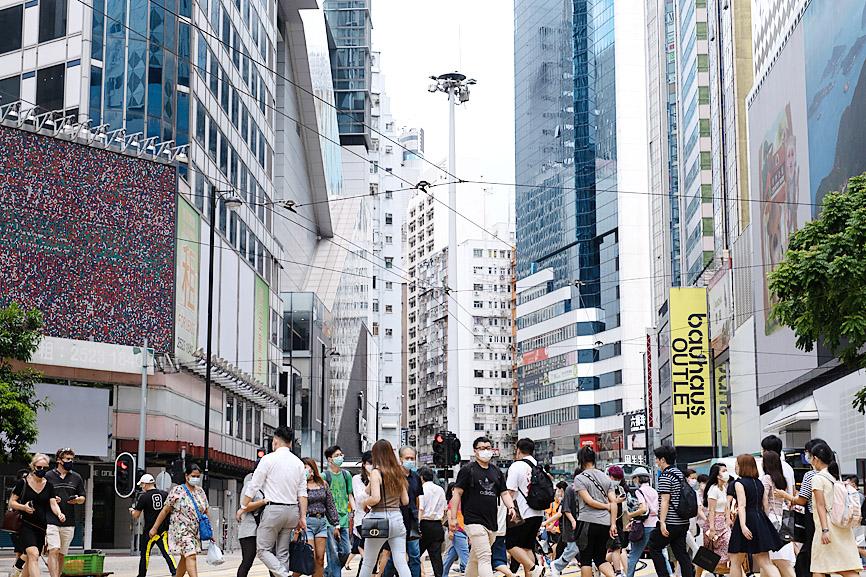Hong Kong police have been granted sweeping new powers, including the ability to conduct raids without a warrant and secretly monitor suspects, after controversial security laws were imposed on the territory by the Chinese government.
The powers allow for the confiscation of property related to national security offenses, allow senior police to order the takedown of online material they believe breaches the law, and grant police permission to intercept communications and conduct covert surveillance.
They also allow police to enter and search premises for evidence without a warrant “under exceptional circumstances,” to restrict people under investigation from leaving Hong Kong, and to demand information from foreign and Taiwanese political organizations and agents on their Hong Kong-related activities.

Photo: Bloomberg
The details of the implementation rules took effect yesterday and details were released after the Committee for Safeguarding National Security of the Hong Kong Special Administrative Region, chaired by Hong Kong Chief Executive Carrie Lam (林鄭月娥), convened its first meeting on Monday.
Before the release of the implementation rules, Facebook, WhatsApp and Telegram said they would deny law enforcement requests for user data in Hong Kong as they assess the effect of the national security legislation.
Lam told “radicals,” who she said had brought danger to the country, “not to challenge the law or the consequences would be serious... If people are law-abiding and never think about endangering national security, there is no cause for concern ever.”
Asked about widespread concerns among local and foreign media that the laws put them at risk by criminalizing acts of journalism, Lam said it was “not a question of me giving a guarantee on what you may or may not do.”
“If [the Hong Kong Foreign Correspondents’ Club] or reporters in Hong Kong can give me 100 percent guarantee that they will not commit offenses under this legislation, then I can do this,” she said.
She accused foreign press and governments of stoking fear, saying the new laws were “not doom and gloom,” and she had not noticed fear among residents.
“This law only targets four types of urgent matters,” she said repeatedly. “It does not undermine the rights and freedoms of people in Hong Kong.”
The day before, eight people were arrested at a silent protest where demonstrators held up blank pieces of paper at the Kwun Tong shopping mall.
They were protesting against the outlawing of pro-independence slogans, including “Liberate Hong Kong, the revolution of our time.”
The official Procuratorial Daily yesterday announced that China had launched a special task force to increase political policing to maintain social stability on the mainland.
The task force would “crack down on all kinds of infiltration, subversion, sabotage, violent terrorist activities, ethnic separatist activities and extreme religious activities,” according to the undated notes from a meeting of the task force published in the paper on Monday.

INVESTIGATION: The case is the latest instance of a DPP figure being implicated in an espionage network accused of allegedly leaking information to Chinese intelligence Democratic Progressive Party (DPP) member Ho Jen-chieh (何仁傑) was detained and held incommunicado yesterday on suspicion of spying for China during his tenure as assistant to then-minister of foreign affairs Joseph Wu (吳釗燮). The Taipei District Prosecutors’ Office said Ho was implicated during its investigation into alleged spying activities by former Presidential Office consultant Wu Shang-yu (吳尚雨). Prosecutors said there is reason to believe Ho breached the National Security Act (國家安全法) by leaking classified Ministry of Foreign Affairs information to Chinese intelligence. Following interrogation, prosecutors petitioned the Taipei District Court to detain Ho, citing concerns over potential collusion or tampering of evidence. The

‘FORM OF PROTEST’: The German Institute Taipei said it was ‘shocked’ to see Nazi symbolism used in connection with political aims as it condemned the incident Sung Chien-liang (宋建樑), who led efforts to recall Democratic Progressive Party (DPP) Legislator Lee Kun-cheng (李坤城), was released on bail of NT$80,000 yesterday amid an outcry over a Nazi armband he wore to questioning the night before. Sung arrived at the New Taipei City District Prosecutors’ Office for questioning in a recall petition forgery case on Tuesday night wearing a red armband bearing a swastika, carrying a copy of Adolf Hitler’s Mein Kampf and giving a Nazi salute. Sung left the building at 1:15am without the armband and apparently covering the book with a coat. This is a serious international scandal and Chinese

Seventy percent of middle and elementary schools now conduct English classes entirely in English, the Ministry of Education said, as it encourages schools nationwide to adopt this practice Minister of Education (MOE) Cheng Ying-yao (鄭英耀) is scheduled to present a report on the government’s bilingual education policy to the Legislative Yuan’s Education and Culture Committee today. The report would outline strategies aimed at expanding access to education, reducing regional disparities and improving talent cultivation. Implementation of bilingual education policies has varied across local governments, occasionally drawing public criticism. For example, some schools have required teachers of non-English subjects to pass English proficiency

TRADE: The premier pledged safeguards on ‘Made in Taiwan’ labeling, anti-dumping measures and stricter export controls to strengthen its position in trade talks Products labeled “made in Taiwan” must be genuinely made in Taiwan, Premier Cho Jung-tai (卓榮泰) said yesterday, vowing to enforce strict safeguards against “origin laundering” and initiate anti-dumping investigations to prevent China dumping its products in Taiwan. Cho made the remarks in a discussion session with representatives from industries in Kaohsiung. In response to the US government’s recent announcement of “reciprocal” tariffs on its trading partners, President William Lai (賴清德) and Cho last week began a series of consultations with industry leaders nationwide to gather feedback and address concerns. Taiwanese and US officials held a videoconference on Friday evening to discuss the